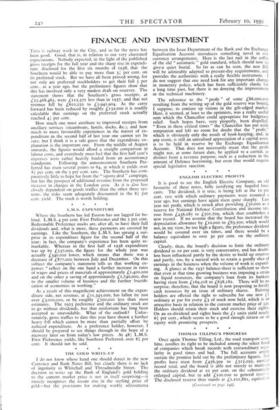FINANCE AND INVESTMENT
THIS is railway week in the City, and so far the news has been good. Good, that is, in relation to our very chastened expectations. Nobody expected, in the light of the published gross receipts for the full year and the sharp rise in expendi- ture disclosed for the first six months of 1938, that the Southern would be able to pay more than 31 per cent. on its preferred stock. But we have all been proved wrong, for not only are preferred stockholders to get their full 5 per cent., as a year ago, but the preliminary figures show that this has involved only a very modest draft on reserves. The statement shows that the Southern's gross receipts, at £25,468,465, were £112,371 less than in 1937, and that net revenue fell by £610,220 to £5,941,904. As the carry forward has been reduced by roughly £132,000 it is readily calculable that earnings on the preferred stock actually reached 41 per cent.
How much one must attribute to improved receipts from ancillary services (steamboats, hotels, docks, &c.), and how much to more favourable experiences in the matter of ex- penditure in the second half of last year one cannot yet be sure, but I think it is a safe guess that the expenditure ex- planation is the important one. From the middle of August onwards, the figures would afford a straight comparison in labour costs, and everybody must feel that the first half year's expenses were rather heavily loaded from an accountancy standpoint. Following the announcement Southern Pre- ferred has risen several points to 64, at which it yields over 81 per cent. on the 5 per cent. rate. The Southern has com- paratively little to hope for from the "square deal" campaign, but has the prospect of additional revenue from the proposed increase in charges in the London area. As it is also less closely dependent on goods traffics than the other three sys- tems, the risks seem adequately discounted in the 81 per cent. yield. The stock is worth holding.














































 Previous page
Previous page